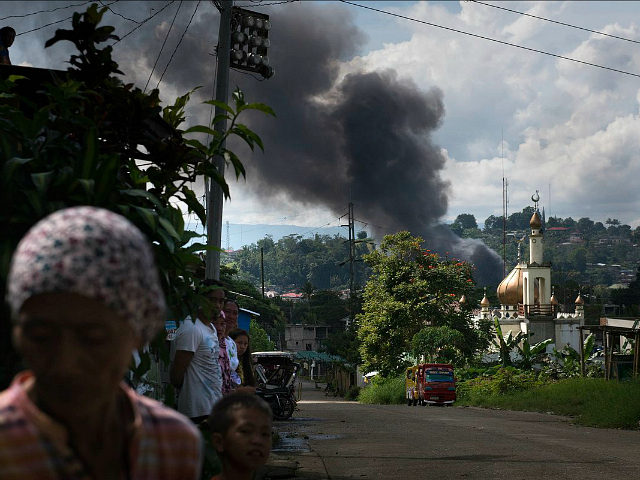The battle against Islamic State forces in the southern Philippine city of Marawi has entered its fourth week, despite promises from the administration of President Rodrigo Duterte that the insurgency would be crushed before the national Independence Day holiday on June 12.
CNN notes that spokesmen for Duterte are now saying at least two more weeks of fighting will be needed to cleanse Marawi of ISIS-aligned militants.
Thirteen Philippine Marines were killed and forty others wounded in an all-day clash with Islamic State forces on Saturday, making it one of the deadliest single days of the conflict for government forces. The battle began as an operation to rescue civilian hostages. A total of 58 government troops have been killed during the insurgency, along with 24 civilians and an estimated 120 militants.
The high risk of casualties among the 1,000 civilians trapped in the city was cited as a reason for slower-than-expected progress. Also, CNN’s correspondent reported militants are “taking shelter in the city’s mosques, using their characteristic minarets as sniper positions.” The battle on Saturday saw government troops taking fire from militants “using mosques as their safe haven,” according to a military spokesman.
On Sunday, President Duterte visited wounded soldiers at a hospital on the island of Mindanao, then gave a press conference in which he said Philippine intelligence officials told him Islamic State leader Abu Bakr al-Baghdadi personally ordered “terroristic activities” in the Philippines.
This would seem somewhat contrary to accounts that the battle began spontaneously when Philippine troops attempted to arrest the leader of a local terrorist group allied with ISIS, and his call for help drew a swarm of militants from various other groups eager to make a favorable impression on the Islamic State. The terrorist leader whose attempted arrest touched off the Marawi crisis, Abu Sayyaf leader Isnilon Hapilon, evidently remains at large.
Duterte went on to claim that the siege of Marawi was actually a power play by drug gangs, so he apparently did not mean to imply that Baghdadi personally ordered the capture of the city.
“Rebellion was financed by drug money. It has nothing to do with religion. I refuse to believe that it is religion that fueled this war,” said Duterte, whose antipathy for drug gangs is legendary.
However, on Tuesday, Philippine Solicitor General Jose Calida submitted a brief in defense of Duterte’s order for martial law on Mindanao that stated the Philippine government has known since 2014 that ISIS was looking to capture territory in the region.
According to this statement, local groups including Abu Sayyaf, Maute, and the Bangsamoro Islamic Freedom Fighters swore allegiance to the ISIS “caliphate” almost three years ago. This is a point of political contention in the Philippines because the administration of Duterte’s predecessor, Benigno Aquino III, insisted ISIS had no presence in the Philippines.
Calida also stated that ISIS extremists were planning to attack Marawi during Ramadan and actually “burn down the entire city,” in a bid to inspire other rebel groups to launch attacks across Mindanao, but the operation to capture Hapilon forced them to act prematurely.
Duterte is feeling political pressure over the extended siege of Marawi, including the court challenge to his order for martial law that Calida is handling. Critics argue that the order is too broad because there is little evidence of violent insurgency brewing outside the area around Marawi City. The court drama included a bizarre argument that ISIS-aligned terror gangs like Maute and Abu Sayyaf acted in legitimate self-defense against invading government troops when they attacked Marawi.
Opposition leaders are also pushing the Duterte administration over U.S. special forces and CIA involvement in the battle of Marawi, accusing Duterte of hypocrisy for seeking help from the U.S. government he frequently lambastes.
Rep. Carlos Zarate, who called for an investigation of American involvement in the crisis, stated that the United States supports the Islamic State and is using ISIS militants in the Philippines to “undermine regimes like the Duterte administration for the geopolitical and economic interests of the American government.”
The U.S. Embassy to the Philippines stated on Saturday that U.S. special forces are assisting the Philippine military in Marawi but would not provide further details.

COMMENTS
Please let us know if you're having issues with commenting.